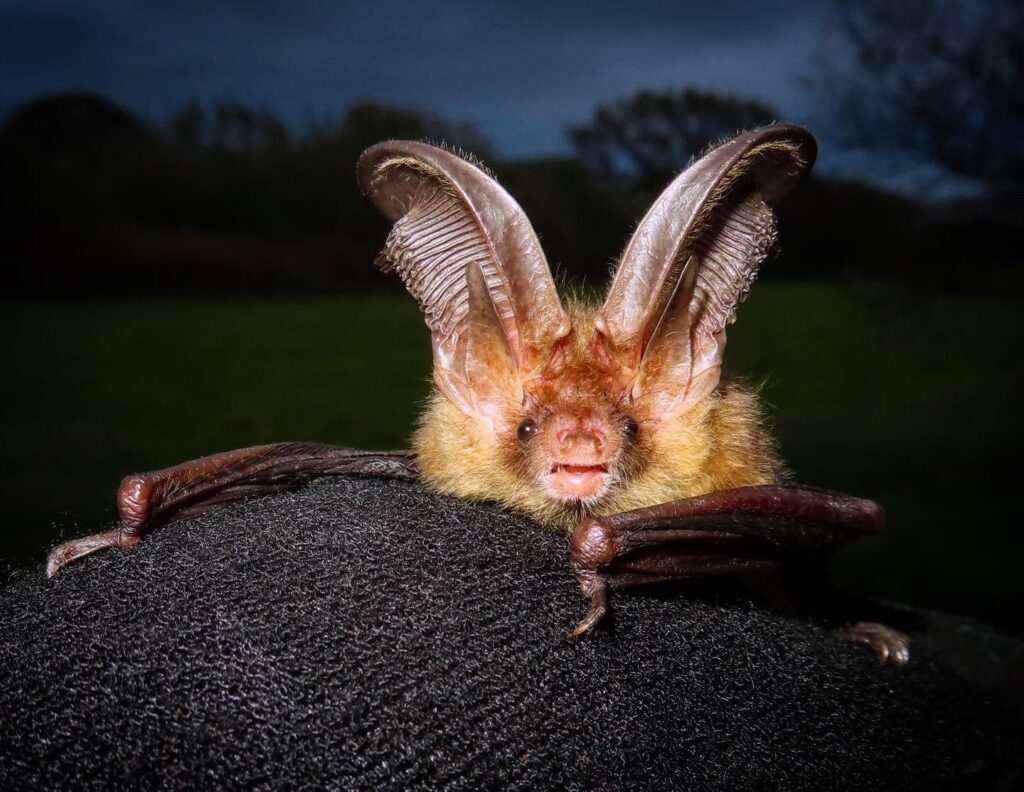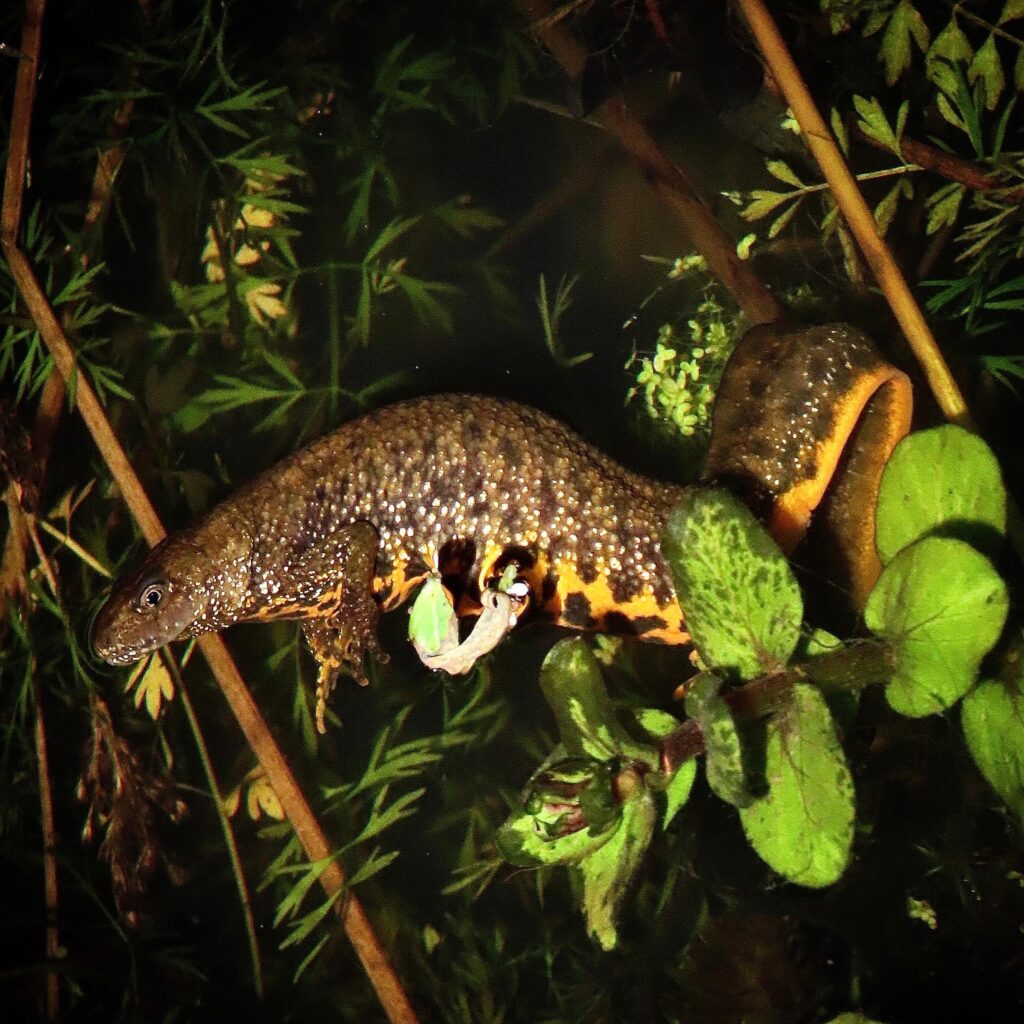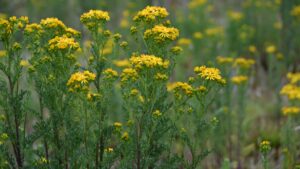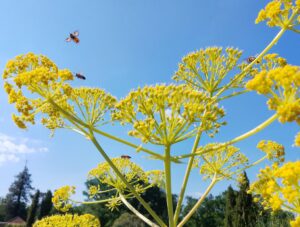
Podcast Episode 36 – The Dove From Above
PODCAST EPISODE 36: The Dove From Above Join us on a beautiful June evening for episode 36 of the Knepp Wildland Podcast. We’re joined by
Home / Don’t bash the bats! The natural world is the branch that supports us all.

Matt Phelps | Lead Ecologist
“Focus on getting things built and stop worrying about the bats and the newts”
…so said the Chancellor of the Exchequer, Rachel Reeves, in her speech in Oxford last week, setting out her plan to “kickstart economic growth”. A speech which, among other things, outlined the government’s support for the expansion of a host of airports – most immediately the creation of a third runway at Heathrow – and the building of 1.5 million houses in the next five years.
Reeves made the seemingly throwaway-yet-headline-grabbing comment about bats and newts in relation to for the HS2 railway line. It is widely observed to be a colossally expensive and ecologically disastrous project which, since construction began in 2019, has already cost over £30 billion and ploughed through hundreds of local wildlife sites, ancient woodlands and over thirty sites of special scientific interest. Indeed, a report published by The Wildlife Trusts in 2023 concluded that the project had already caused eight times more net nature loss than predicted.
Thankfully, Phase 2 of that project has now been scrapped, but at what cost to the landscapes and communities already affected by Phase 1? Ancient trees felled and replaced by dying saplings in plastic tubes. Irreplaceable habitats gone forever. Some protection for bats seems a rather paltry offering in the wider context of the project.

Brown long-eared bat at Knepp, photographed by Ryan Greaves under licence
Britain is one of the most nature-depleted countries on Earth. According to the most recent State of Nature report, published in 2023, one in six of all wild species are now at risk of national extinction. We have 73 million fewer birds than we did in 1970, with 43% of all regularly-occurring species now classified as threatened. Despite what Rachel Reeves might think she knows about bats and newts, these have also declined significantly in recent decades too, with some bat species down by more than 10% since the 1970s, and great crested newts dramatically reduced in the same timeframe.
More than any other country in Europe, our quest for growth has seen us systematically destroy, fragment and degrade swathes of once precious natural habitat, losing the species which relied on them.
Perhaps Rachel Reeves ought to read Kate Raworth’s brilliant book Doughnut Economics: Seven Ways to Think Like a 21st Century Economist, in which she describes her ingenious circular economy model whereby the outer ring represents a sustainable ecological ceiling, and the inner ring symbolises a healthy social foundation. In other words, the baseline for an equitable and sustainable human population. The space in the middle represents what Raworth calls the “safe and just space for humanity”. If we rise too far beyond that inner circle, we unleash pollution, deforestation, ocean acidification, and more – all things we are already doing, of course. When we fall too far below the social foundation, we fail to provide a liveable existence for ourselves. It’s a gloriously simple concept but makes perfect sense as a long-term alternative to the mantra of endless growth.
Raworth explains:
“Economics day-1 says, ‘here’s the market!’ and immediately puts the market at the centre of vision as if the economy is – essentially – the market and the only metric of concern is price. On that basis, our economy handily adds up to our GDP… very neat indeed! And anything outside that contract? Oh well, that’s an externality. So here we are, in the early days of the 21st century, talking about the death of the living world as an environmental externality. That alone should be an alarm-bell that our framework doesn’t serve our time.”
Among other things the new government seemingly have in their sights to axe are the wild release of beavers and the study of natural history at GCSE. These are apparently seen as unwelcome Tory legacies. But over six million properties in England are now at risk of flooding, and wetland engineering by beavers has been proven to help build flood resilience within landscapes. This week, the government even announced a £2.6 billion investment in flood defences – but seemed to overlook the opportunity to allow beaver releases to be part of it.

Female Great Crested Newt at Knepp, photographed by Ryan Greaves under licence
We need a government which progressively considers how working with nature can deliver solutions to the problems we face. Instead, we have some of the most senior politicians in government making flippant remarks about our already beleaguered wildlife. We need to get away from the hideously anachronistic idea that nature is ‘nice to have’ rather than an essential life support system; it is, after all, the branch on which we are all sitting.
The Dasgupta Review, commissioned by the UK Treasury in 2019, described nature as our most precious asset, upon which “our economies, livelihoods and well-being all depend”. ‘Growth, growth, growth’ and ‘build, build, build’ may be easy slogans with which to grab headlines and win fleeting bursts of support, but when it comes to the ongoing onslaught on the living world, we are all in it together.
As Sir David Attenborough famously said in 2013: “anyone who thinks that you can have infinite growth in a finite environment is either a madman or an economist”. And perhaps that’s food for thought for the UK’s most powerful economist.
Main image is a male palmate newt, photographed by Ryan Greaves under licence

PODCAST EPISODE 36: The Dove From Above Join us on a beautiful June evening for episode 36 of the Knepp Wildland Podcast. We’re joined by

Matt Phelps | Lead Ecologist It’s mid-June and the countryside is quietly gearing up for its summer crescendo. You might have noticed it already— what

Moy Fierheller | Deputy Head Gardener Visit Knepp’s rewilded Walled Garden The fine, fairy-tale spring continues and the Met Office reports it’s the sunniest in
Knepp Wildland Safaris, our gardens and campsite are all about the quiet and patient observation of nature.
Some of the species we are likely to encounter are shy or can be frightened by loud noises or sudden movements. Our campsite with open-air fire-pits, wood-burning stoves and an on-site pond is unsuitable for small children.
For this reason, our safaris, garden visits, holiday cottages and campsite are suitable only for children of 12 and over.